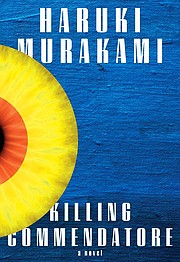Haruki Murakami, superstar Japanese novelist, has long been "infatuated" with F. Scott Fitzgerald's The Great Gatsby. He has called the book crucial to his own writing career, and in 2006 realized a long-held ambition to translate Gatsby into Japanese.
I share Murakami's enthusiasm for Gatsby. It is one of the greatest American novels, a story about the American right to re-invent oneself. Gatsby is a self-made man -- he "sprang from his Platonic conception of himself" and has "just begun to be." He is an American prototype. Robert Zimmerman would follow him out of the Iron Country and, as Bob Dylan, build a gold-domed Xanadu in Malibu. Gatsby is the New World scuffling up to power, to the chagrin and vague distaste of Old Europe. He is New Money courting -- but never winning -- the respect of the entrenched and invisible classes.
Gatsby has such beautiful shirts that a certain kind of woman can be moved to tears. He has to die so we might all remember our place and the evanescence of dreams.
Murakami's new novel Killing Commendatore is, in the most basic sense, his remake (re-imagining) of Gatsby. It's also very Murakami-esque. It is told in first person by a nameless self-effacing artist who, understanding the limits of his talent and ambition, has made a good living producing commissioned portraits. He married a woman who reminded him of his little sister, who died when she was 12 and he 15 years old. After six years, his wife left him, for vague reasons.
He responded by spending a few weeks driving around Japan, staying in cheap motels, suffering claustrophobic nightmares and thinking his own thoughts. Ultimately, through the intercession of a former art school classmate, he finds himself the caretaker of a remote house on a mountain, the home/studio of famous painter Tomohiko Amada, who has recently been moved to a nursing facility. Amada showed promise painting in Western styles before World War II when he studied in Vienna, but after the war won great acclaim as a Japanese-style painter.
Our artist recognizes he is no Amada, but realizes he wants to do more than produce commodified portraits. When he started out, he didn't make representational paintings; he's determined to start painting for himself again. A sojourn in the artist's house seems promising -- there are few distractions, not even any art hanging on the walls. There's no TV, no Internet access. But there is "a wonderful stereo set .... the speakers were huge Tannoy Autographs, the separate amplifier an original vacuum tube Marantz. And ... an extensive collection of vinyl records ... a lot of boxed sets of opera."
And there's a great view from Amada's terrace: a mountain range, a patch of the Pacific, an array of houses including a white mountaintop mansion that resembles an ocean liner.
This mansion belongs to the Gatsby figure, Wataru Menshiki, an impeccably groomed 50-something retired tech magnate who has scrupulously scrubbed cyberspace of all mentions of himself. Menshiki -- the name means "avoiding color" -- has hair that is "an almost obsessive white." He wants our artist to paint him. He offers a convincing amount of money.
Menshiki lives alone, spying through mil-spec binoculars on a young girl who lives across the valley. She may be his daughter.
She's definitely his green light at the end of Daisy's dock. As our artist is the Nick Carraway figure.
But because Murakami is Murakami, Killing Commendatore is more that three times longer than The Great Gatsby, which comprises less than 50,000 words. And it takes some thrilling detours -- the title comes from a wild and violent painting our protagonist finds in the attic of his house, a scene from the opera Don Giovanni Amada has imagined in the Japanese style -- and runs down some rabbit holes that occasionally feel, for maybe the first time in a Murakami novel, a bit show-offy and mannered.
That's not to say that Murakami fans won't find much to enjoy -- this new novel is highly readable, even when it shifts into a discussion of quantum probabilities and the transient nature of sense. The voice is dry and haunted, gentle but informed by an existential trauma. It's the sort of novel you look forward to reading at the end of the day, which is to say you don't feel the need to rush to finish it.
At the same time, some might be exasperated by it. There is a sense that Murakami is playing his hits -- all these intelligent lonely men, sipping their Scotch and listening to their vinyl, batting on against the current, borne back ceaselessly into the past.
Email:
blooddirtangels.com
Style on 10/14/2018

